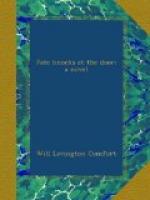There is not even a laughing pretense here that Adelaide was a real woman; but real women, even in this era of woman, often fail to remember what pure attractions to man, are their silences and their minor tones.
Just a fortnight—but what a tearing it was to leave her! Old Mother Nature must have writhed at this parting—groaned at the sight of the boy staring back from the high stern of the Truxton, at the stars lowering over the city and the woman, Adelaide. Possibly she retained something from the depth of his individuality.... Bedient would not have said so; but there is no doubt that her importance in his life was that of a mannequin upon which to drape his ideals. Had he seen her, in the later years, he would have met the dull misery of disillusionment. Adelaide was a boy’s sensational trophy. Her distant beauty and color was the art and pigment of his own mind.
A soul rudiment, a mental bud, and a beautiful prophylactic body—such was her equipment. He dreamed of her as a love flower of inextinguishable sweetness. The mere abstraction of her sex,—colorless enough to most grown men,—was a sort of miracle to the boy. He made it shining with his idealism.... Frail arms held out to him; cool arms that turned electric with fervor. Unashamed, she took him as her own....
Exquisite devourer, yet she had much to do in bringing forth from the latent, one of the rarest gifts a boy can have—lovelier than royalty and fine as genius—the blue flower of fastidiousness. Adelaide, all unconcerned, identified herself with this, and it lived in the foreground of his mind. She became his Southland, his isle of the sea. Winds from the South were her kisses—almost all the kisses he knew for years afterward. Living women were less to him than her memory. Facing the South, through many a hot-breathed night, he saw her—and the little house.... And what a drowsy-head she was! Nothing to do with the morning light, had she, save when it awakened, to shut it out impatiently, and turn over to the dimmest of walls until afternoon. She had never been truly alive until afternoon. How he had laughed at her for that!... A creature of languors; a mere system of inert dejected cells when alone, pure destructive principle, if you like,—yet she held this boy’s heart to her, without a letter, possibly with little or no thought of him, across a thousand leagues of sea—and this, through those frequently ungovernable years in which so many men become thick and despicable with excess.
Bedient often questioned himself—why he had not given up his berth on the Truxton and remained longer in Adelaide. There were a dozen ships in the harbor to take him forth when he cared. This thought had not come to him at the time. Quite as remarkable was the formidable something which arose in his brain at the thought of going back. This was not to be fathomed then—nor willed away. The roots of his integrity were shaken at the thought of return. Andrew Bedient at thirty-four understood. His was a soul that could thrive on dreams and denials. Even half-formed, this soul was the source of a strange antagonism, against which the fleshly desire to return was powerless. Poise, indeed, for a cook among sailors and packers.




